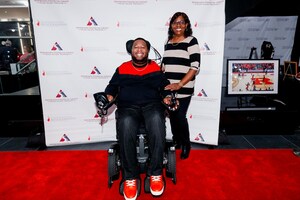SHORT HILLS, N.J., March 30, 2017 /PRNewswire-USNewswire/ -- The Christopher & Dana Reeve Foundation Paralysis Resource Center (PRC) announced today that it has awarded seven High Impact Innovative Assistive Technology (HIIAT) Grants, totaling $520,996, strengthening the Reeve Foundation's dual mission of Today's Care, Tomorrow's Cure®. Funding for the grants is made available through the Paralysis Resource Center (PRC) operated by the Reeve Foundation under a cooperative agreement with the Administration for Community Living (ACL) in the U.S. Department of Health and Human Services.
The Reeve Foundation introduced the High Impact Innovative Assistive Technology Grants in 2015 to increase support for organizations and projects rooted in technology and to fuel initiatives to improve the quality of life and independence for individuals living with paralysis.
"As assistive technology continues to expand in our digital world, we want it to be a major asset to our community. All seven grantees enhance opportunities for individuals living with paralysis to successfully live independently in the community," said Maggie Goldberg, Vice President of Policy and Programs, Christopher & Dana Reeve Foundation. This year's funded projects address a wide range of challenges and target a spectrum of age groups from very young children to older persons with significant disabilities, and engage with Centers for Independent Living and other agencies to maximize reach and impact. Our goal is to expand the HIIAT grant program and our impact in the communities we serve."
The High Impact Innovative Assistive Technology Grants program was created and launched with expert technical assistance and guidance from the Rehabilitation Engineering Assistive Technology Society of North America (RESNA).
"At the end of the day, creating more opportunities for independence is and always will be our main goal," said Donna Valente, Director of Quality of Life Grants. "I'm excited to see these projects come to life and not only increase inclusion, but also create connections with different groups in communities across the nation."
The critical need for home accessibility was evidenced in three of the seven awards. Several of the projects focus on enabling people with paralysis that live in rural communities to maintain their independence, health and wellness. Projects stress new low cost, high impact methods of designing, fabricating, manufacturing and customizing AT solutions locally and offer an array of services and products. This cycle's recipients of the HIIAT Grant include:
Massachusetts Rehabilitation Commission, Boston, Massachusetts - $74,878
The Massachusetts Rehabilitation Commission's award funds "The Weight and Seating Independence Project," which will provide wheelchair accessible scales and digital pressure mapping technology to centers in rural communities throughout the state to enable people with spinal cord injury to proactively control their weight and prevent skin breakdown; both essential to staying healthy and maintaining their independence.
Northern Arizona University-Institute for Human Development, Flagstaff, Arizona - $74,926
The Institute for Human Development of Northern Arizona University has created "Up a Go," a project to facilitate early mobility and assisted walking of young children with physical challenges so that they can engage in age-appropriate activities. The project will significantly expand the inventory of available early mobility equipment to loan out to families, provide training to therapist and service providers, and offer a hands-on DIY workshop for parents to create customized cost-effective mobility equipment.
Temple University – Institute on Disabilities, Philadelphia, Pennsylvania - $75,000
Temple University's project entitled Adaptive Design of Greater Philadelphia will improve access to assistive technology focused on improved seating, positioning and access that will facilitate inclusion and education for individuals with paralysis, particularly very young children, ages birth to 6 years old. Further, staff and area service providers will be trained in methods for designing and fabricating low-technology, low-cost solutions that are customized, safe, and durable.
University of New Hampshire – Assistive Technology in New Hampshire, Durham, New Hampshire - $75,000
The University of New Hampshire - Assistive Technology in New Hampshire's project entitled I CreATe for Paralysis Project will develop a self-sustaining open-ended loan program to increase awareness of types of low-cost solutions that can be made in minutes to support individuals with paralysis that reside in rural areas.
Inadequate or non-existent access to residences may result in longer and otherwise unnecessary stays for individuals in hospital or rehabilitation facilities, and can ultimately force individuals to move into long-term care facilities, removing them from their families and communities. Lack of access may cause undue hardship on caregivers who must struggle physically to get individuals into and out of their homes, severely limiting independence and community involvement and increasing risk of injury for both the person with paralysis and the caregiver. Finally, lack of accessibility presents a serious and potentially fatal safety hazard if it causes a person to be stuck in their home with no way out. These three projects will mitigate the basic but critical problem of lack of home accessibility:
Illinois Assistive Technology Program, Springfield, Illinois - $74,935
The Illinois Assistive Technology Program's Temporary Ramp Project will alleviate barriers to independence by providing long-term loans of temporary metal ramps to low-income adults with paralysis living in rural counties of Illinois for their residences.
Virginia Assistive Technology System, Henrico, Virginia - $75,000
The Virginia Assistive Technology System's PAKD! – Portable Accessibility Kits on Demand project will provide loans of temporary ramps, accessible pathways and raised thresholds to individuals with newly acquired paralysis and their caregivers, as well as older Virginians and their caregivers that develop barriers to mobility.
Office of Vocational Rehabilitation, Frankfort, Kentucky - $71,257
The Office of Vocational Rehabilitation's project entitled Ramp Up Kentucky will provide temporary ramp solutions to individuals with recently acquired disabilities and people aging in their homes so that they are not confined to their homes while waiting for a long-term solution to accessibility to be put into motion.
About the Reeve Foundation:
The Christopher & Dana Reeve Foundation is dedicated to curing spinal cord injury by funding innovative research and improving the quality of life for people living with paralysis through grants, information, and advocacy. The Paralysis Resource Center (PRC) is the support side of the Reeve Foundation's twin missions to provide "Today's Care" and to strive for "Tomorrow's Cure" and offers a free, comprehensive, national source of informational support for individuals living with paralysis and their caregivers. We meet all 20 of the Better Business Bureau's standards for charity accountability and hold the BBB's Charity Seal. For more information, please visit our website at www.ChristopherReeve.org or call 800-539-7309.
SOURCE Christopher & Dana Reeve Foundation
Related Links
WANT YOUR COMPANY'S NEWS FEATURED ON PRNEWSWIRE.COM?
Newsrooms &
Influencers
Digital Media
Outlets
Journalists
Opted In






Share this article